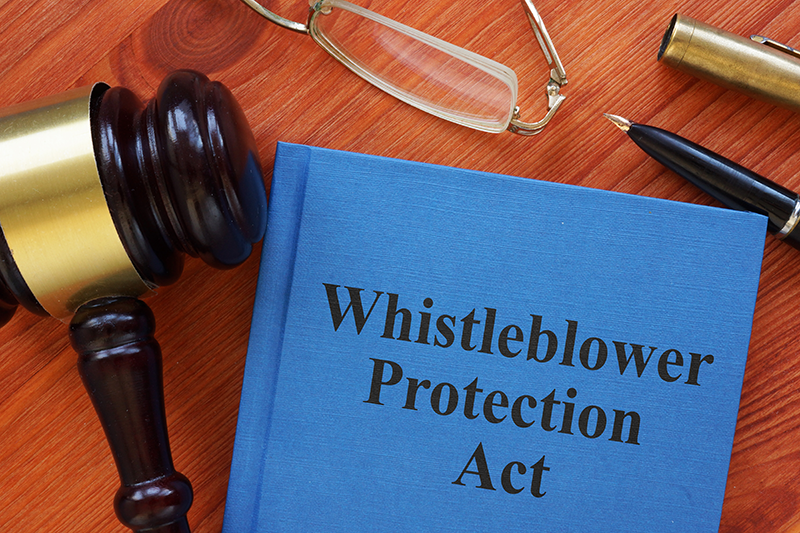In an unfortunate decision for New Yorkers concerned about COVID-19 in the workplace, a federal judge recently ruled that the state’s whistleblower protection law does not apply to workers who complain about their employer’s failure to follow public health guidance.
The narrow reading of New York Labor Law Section 740 by the U.S. District Court for the Southern District of New York in HC2, Inc. v. Delaney could have a chilling effect on workers who have legitimate COVID-related concerns about returning to the workplace while the virus remains a threat to their health.
Protections for Whistleblowers Who Report Dangers to Public Health or Safety
Section 740 prohibits retaliation against an employee who “discloses, or threatens to disclose to a supervisor or to a public body an activity, policy or practice of the employer that is in violation of law, rule or regulation which violation creates and presents a substantial and specific danger to the public health or safety.”
In HC2, the court focused on whether the alleged deficiencies in the employer’s COVID-19 policies and practices were “in violation of law, rule or regulation…”
Violating Guidance From Public Health Officials Is Not Enough to Trigger Whistleblower Protections
Delaney, an attorney working on a temporary document review assignment for HC2, a legal staffing agency, emailed the company’s human resources department complaining that HC2 had permitted several employees to come to work with “flu-like symptoms,” despite a “closed [workplace] environment.” Concerned for his well-being, Delaney requested the ability to “work from home,” something that had previously been offered on other projects, or to “be paid to stay at home.”
HC2 denied the request to work remotely, terminated Delaney, and filed a lawsuit against him, alleging violations of his employment agreement. Delaney claims that HC2 took these actions in retaliation for his complaints about its safety practices in violation of Section 740.
The court began its analysis by noting that to maintain an action under Section740, at least at the pleading stage, an employee must specify that there was an actual violation of law, rule, or regulation and describe how their employer’s activities endangered the health and safety of the public.
In this case, Delaney complained that HC2’s conduct violated:
- Two of Governor Cuomo’s executive orders declaring a State of Emergency and instructing specific categories of employers to observe certain safety measures.
- New York City Health Department guidance to employers that they should promote physical distancing and send home immediately workers who arrive sick or become sick at work.
- Interim guidance from the federal Centers for Disease Control and Prevention indicating that employers “are responsible for providing a safe and healthy workplace” and should “separate[e] sick employees.”
In granting HC2’s motion to dismiss Delaney’s claims, the court held that the cited executive orders did not prohibit the complained-of conduct, nor did they require private employers to bar apparently sick employees from coming to work or allow employees to work from home.
As to the claimed violations of guidance from the city health department and CDC, the court noted that Section 740(1)(c) defines “law, rule or regulation” to “include[e] any duly enacted statute or ordinance or any rule or regulation promulgated pursuant to any federal, state or local statute or ordinance.” The court held that public health guidances do not cut it under this definition. They “are not laws, rules, or regulations the violation of which can give rise to a New York whistleblower claim.” Instead, they constituted “recommendations” or “advice,” “not mandates or dictates.” However, even if these guidances would support a claim under Section 740, the court found the complained-of conduct did not amount to a violation, as none of the guidances were contradicted.
For New York workers, this decision effectively means they are unprotected from retaliation if they report employer COVID-19 policies and practices that may run afoul of CDC or other public health guidance but do not otherwise violate the law. This is indeed an overly restrictive and unfortunate ruling that leaves employees vulnerable to termination simply for expressing concerns about their health.
Outten & Golden: Protecting the Rights of Workers
Despite this decision, New York workers do have the right to a safe workplace, and the law may provide other remedies for employees who have legitimate concerns about the risks posed by COVID-19 where they work. If you have questions or concerns about your rights relating to COVID-19 and employment, please contact the employment attorneys at Outten & Golden today.

